|
年龄差异化会影响政党之间的关系吗? 引言 在过去的几十年中,在各种政党之间存在个多种变化;但是这将引导新的前沿发展,那个时候新人将会用新的方式来获得市场中最好的工作,政治是一个具有很多风险的领导生涯的市场,但是,大部分的政治家相信风险越高,回报就越丰厚,他们就会尽力的去形成一个联盟以维持他们的领导地位,大部分的政治家基于他们的争辩的关系,这个关系是他们和政党之间的关系,而其他的是相对比较稳定的。稳定是大部分政治家所恐惧的政治主要方面,政党中间的任何的不稳定的因素都可能会导致混乱。 政策管理,干预和预防 Does age difference affect political party affiliation?by admin on Monday, December 12th 2011 Tags: Does age difference affect political party affiliation?, free political essay, political essay Introduction There have been various changes in affiliation in various political parties in the past years; however, this has lead to the development of new frontiers, whereby new people come up with new ways of getting their hands ion the best jobs in the market as politicians. Politics is one of the leading careers market with many risks, however, most politicians believe that the higher the risks the better the returns, they go to the extent of forming alliances with their foes to maintain the position of leadership. Most of the politicians base their affiliation on the argument that this is the only way that their relationship with the party and other causal variables can be stable. Stability is on of the major aspects of politics that most politicians fear, any case of instability in the party is likely to cause riff raff. Strategies for management, intervention and prevention Just as it has earlier, drop in the suicides number i s a theme that is central in the health of the government of the strategy of the nation of England. However, there is lack of knowledge that is considerable as to which strategies of preventing are effective. To do an investigation on the effectiveness of strategies of intervention that are different a different measure was used by Haw ton and that is repetition of self-harm that is deliberate. Results that are promising were found solving the problem of therapy, giving of cards to give allowance to patients to make contacts that are of emergency with services, flupenthixol that is for self-harm that is recurrent. The general fear of instability has lead to development of fatherhood in politics. Most politicians create their heir apparent to ensure that their successor is their chosen ones. The grooming of successors is very important for the furtherance of their view, projects and politics. On the other side most young politicians are very interested in having fore runners who baby sit them and incubate their political sons. Research hypothesis Ho: age affects political party affiliations H1: age does not affect political party affiliation People in the modern American have had to change a lot especially in the political arena, most of the politicians have come to realise the importance of political party affiliation and have understood the importance of age factors in the political party affiliation. Politicians are interested in getting the highest number of votes; however, the electorates have shifted their focus on the ability of the elect to deliver. The shifting demographics all point out to the fact that most of the old guards are no longer interested in politics and the youth are trying their hands in politics in a number of regions around the world. There has also been a conservative shift in the electorate as they focus moiré on the age of the potential office holders before they vote. Political Culture and Political Socialization in The world At the start of this chapter, individuals mentioned that to be a Texan is undergoing redefinition continuously by the interplay that is complex of economic, institutional, geographic, social forces and historical that is diverse. Political socialization is a method that complex interplays mould political, social, and individual value systems and identities. This process begins right from the time individuals are conceived and continues throughout our lives. Initiators of socialization are our parents and they influence it at a very high rate since they are the people who stay with us since the time individuals are born. This exposes us to spheres of social life that are very broad. Our families, friends, and our culture act as socialization agents as an individuals. The remaining part of this section looks at the forces and the processes, by which individuals as individuals perpetuate, change and adopt our culture politically. These forces ensure that there is overtime continuity while also allowing change. This change can be either dramatic or even evolutionary. In all the chapters of politics in the world equity between change and continuity in the world society and politics is a theme that is recurring. Individual Political Socialization and its Agents Political socialization is the method by which individuals get values, beliefs and habits of action and thoughts that are related to society, politics and government. It extends beyond getting the knowledge of the facts on how the world practically operates, other than including the development of a worldview of how institutions and people should ideally operate. Values and beliefs of an individual often seem to be something that is obvious, truths that are self evident and indisputable, just like the right to liberty, life and the pursuit of joy. However, the apparent lack of disputes of these beliefs is an extra reflection of the strength of social forces that have put these notions into our patterns of thought from nearly the moment individuals are born. Our scientists who deal with social life have identified a number of socialization agents. Examples of them are the institutions and the people who educate us on values of the society that individuals live and grow in. In addition to the ones mentioned earlier, media of mass communications is also included. Experiences of work and professions, public institutions and the government are also part of this. Initially, individuals learn good behaviour then afterwards individuals are taught or individuals learn political and social attitudes. Our parents through simple comments and body language about the rich, the poor, regulation of economics, business, participation in politics and more initiate this. A nod here, repeated references and grunts to the government crooks could bring a strong impression on the minds of the young people. Rarely do parents educate their children fully elaborated and developed theories of economics or democracy. However, individuals give instinctively small sections of ideology and culture politically, with important gaps and likely inconsistencies that their children slowly fill in via subsequent contact with other socialization agents. As individuals grow up, individuals enlarge our number of influencers or socialization agents. As people go up to schools of higher education, they come across views that are more controversial and contradictory, both inside the classrooms and outside the classrooms. Students learn some views that differ totally with existing attitudes and beliefs and other challenging views. To most of them, whether experience in college confirms or gives a challenge to the existing beliefs, going to the university also gives the initial impetus to being more engaged with politics. Worship places and religion, particularly those of the majority faith in a society, tend also to create the dominant values for that society, if for no other excuse they are strongly embedded in the society, part of the values of the society infrastructure. Moreover, in particular faiths, even in the religion of majority, lack of agreements occur in both politics and doctrine. Howard Miller of the Texas University says that all the United States mainline protestant churches however; individuals are divided in the 1960’s due to race. Since the year 1960, they have split further by tensions of political and social rights of women and after that those of lesbians and gays, in the society. Rising of independent churches is caused by the additional diversity too the origins of conflict. Other aspects that contribute to our socialization politically include professional and work experience and other personal experiences that are points at such as lacking job, losing of a loved one, parenthood and other encounters outside our lives on daily basis. Popular Culture and Political Socialization As individuals mature, individuals take increasing contents and more varieties of entertainment, mass media, including radio, internet, radio, newspapers, music and magazines. Some of what individuals take is mostly political, such commentary and editorials. Influence of popular culture on the formation of culture that is political to our young people is perhaps overblown, if the youths of America tend to be very sceptical and media-savvy in ways that the previous generations did not. How individuals, members of the public, planned interests and the government has made repeated trials to regulate or else condemn some kinds of content particularly the one that shows sexism, violence and themes that are anti-establishment. Their interest is that such languages and images can ss carry away the values that tie our society together. Examples of these values are civility, participation, hard work, citizenship, obedience to the authority etc.#p#分页标题#e# The efforts over the contents of both coverage of news and entertainment that is popular will possibly move on indefinitely due to the presence of media’s massive in our lives. Marketers have a general believe that as individuals grow up individuals turn out to be less malleable in our systems of beliefs and worldviews. This is to mean that individuals become very rigid, put in our ways. This is among the reasons why marketers and teenagers very much aggressively. These tendencies of psychology also feed the impulse to do regulation of advertising and programming directed to children yet it should be aimed to the adults. As the actors of politics struggle to regulate the content of culture that is popular in turn gives a range of opportunities that is broad for moulding the ongoing developments of culture politically and the politics itself. Therefore, while actors of politics and the producers of culture that is popular usually look forward to promoting certain messages, viewpoints, values, their control is certainly limited by coming up tastes, viewpoints of the mass public and preferences. 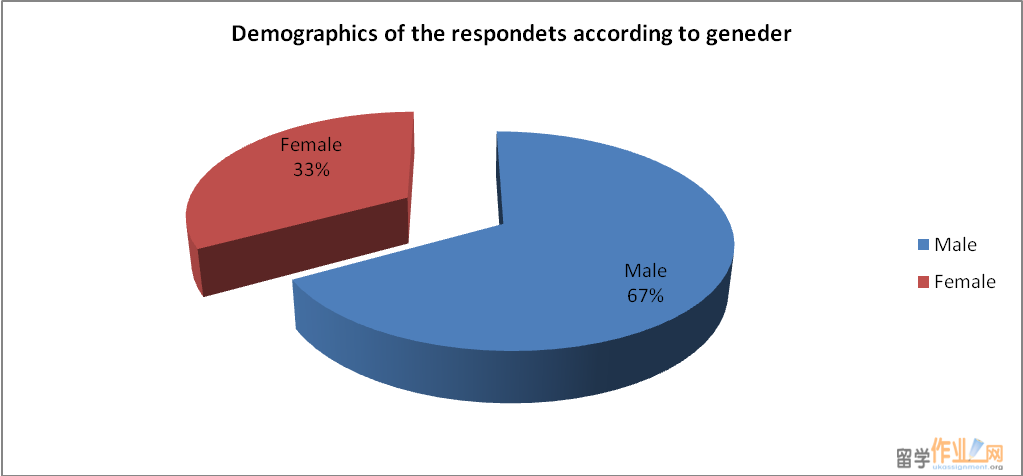 According to the chart, most of the respondent to the study were mainly men who accounted for 67% while the women were reprinted by only 33%, generally like in most elections men for the bulk of the respondents. However, while considering the demographics of according to age, we realise that most of the respondent were the youth in the age brackets of 20-45. 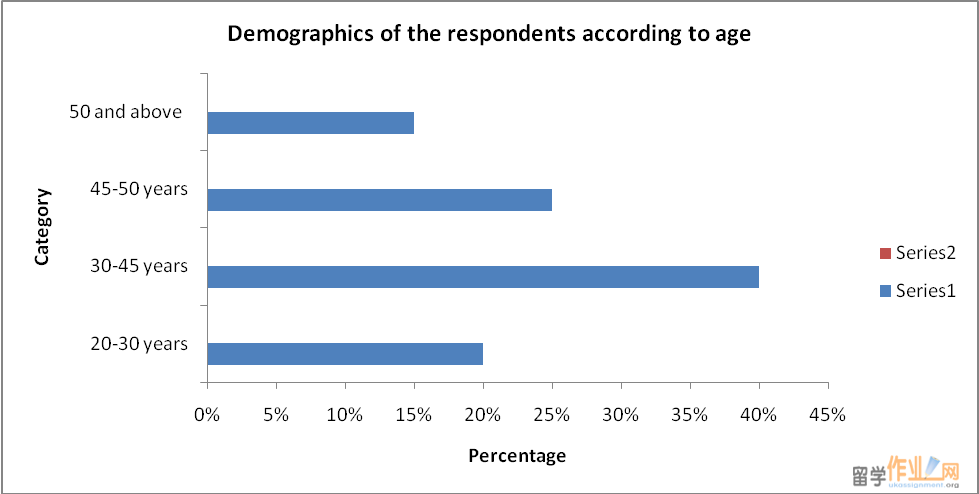 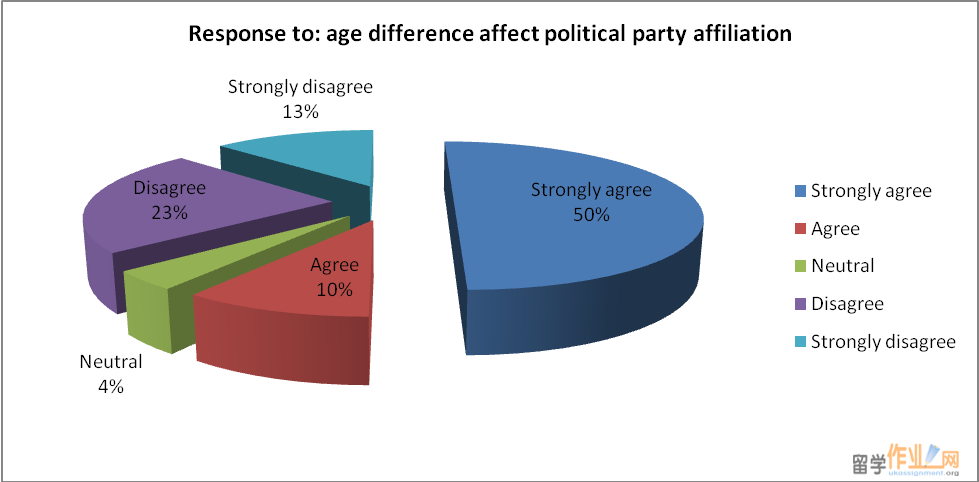 According to the pie chart above, most of the respondents (50%) agree that age difference affects political party affiliations. This is line with the argument that political parties are interested in the development of new heirs. By having young people affiliated to their political parties, they are sure that the future of the party is stable and they have fresh blood in their system. As old people tend to relax during the later years of their political career, they need support from the young population. The youthful leaders also create rapports with the youth and can ensure that the future of the company is stable. Please rate the following concepts according to your degree of opinion 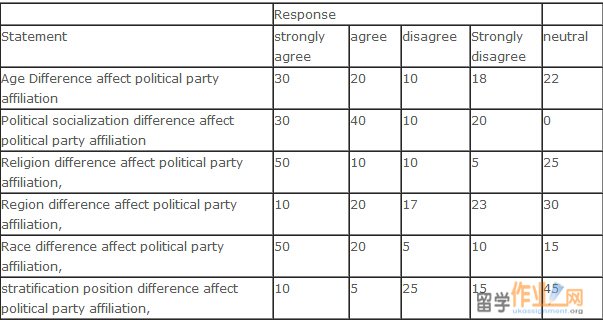 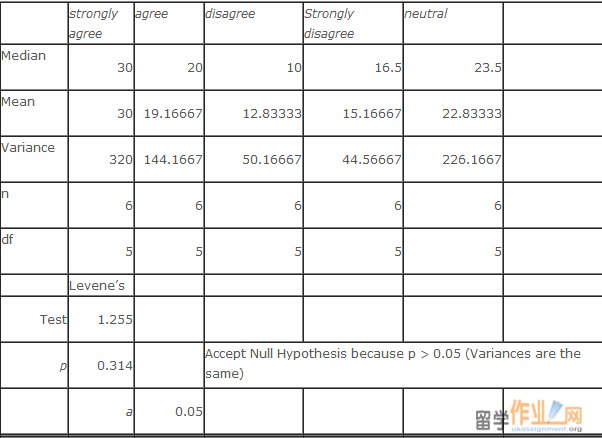 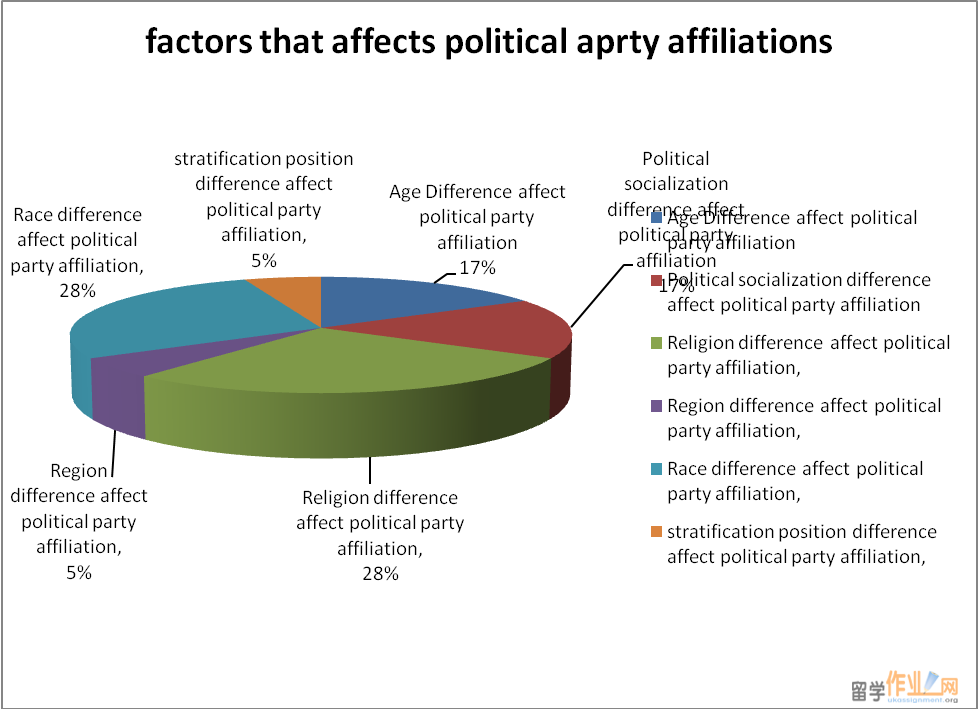 Response Statement strongly agree agree disagree Strongly disagree neutral Age Difference affect political party affiliation 30 20 10 18 22 Political socialization difference affect political party affiliation 30 40 10 20 0 Religion difference affect political party affiliation, 50 10 10 5 25 Region difference affect political party affiliation, 10 17 23 8 30 Race difference affect political party affiliation, 50 20 5 10 15 stratification position difference affect political party affiliation, 10 5 25 15 45 Accept Null Hypothesis because p > 0.05 (Variances are the same) The researcher therefore concludes that age differences affect political party affiliation. References Wolfinger R. E., & Rosenstone S. (1980). Who Votes? New Haven: Yale University Press. Shaffer, W. R. (1972). Computer Simulations of Voting Behavior. London: Oxford University Press. Pomper G. M. (1975). Voter’s Choice: Varieties of American Electoral Behavior. New York: Harvard and Row, Publishers. Nie, N. H., Verba S. & Petrocik J. R. (1976). The Changing American Voter. Massachusetts: Harvard University Press. 156-173. Campbell A., Converse P. E., Miller W. E., & Strokes D.E. (1964). The American Voter. New York: John Wiley & Sons, Inc. Baumgartner J. C., & Francia P. (2008). Conventional Wisdom and American Elections: Exploring Myths, Exploring Misconceptions. Lanham: Rowman &Littlefield Publishers, |
 |
|||
| 网站地图 |

